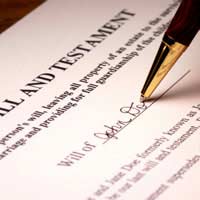When Should I Make a Will?

Making a will is, for many people, one of those things that you intend to do but never quite get round to. This is, of course, not surprising; depending on the complexity of your affairs it can be a fairly complex process and, regardless, contemplating your own death is not a particularly enticing activity. However, constantly postponing the writing of a will is one of the major contributing factors to the fact that 60% of all Britons die intestate.
Bearing this frightening statistic in mind, the obvious answer to the question of when to make a will would be 'now'. Although the process may not be a lot of fun in the short term, it will give you the peace of mind that your affairs will be dealt with as you have intended.
Dependants
If you have any dependants, it is vitally important that you make explicit provision for them as soon as possible. In the event of unexpected death, your assets may not be divided as you would have wished; if your estate totals more than £200,000 (which, if you own your house, is fairly likely) then your spouse will find that they are not entitled to your total assets, regardless of your unwritten intentions. In order to ensure that you estate is passed on correctly you must codify your intentions in a legally valid will.Similarly, if you have children you should definitely think about writing your will sooner rather than later. In the event of the death of both parents, minor dependants (that is, children under the age of 18) will be passed onto a guardian. However, this guardian will be decided upon by the courts, and may well not be the individual that you would have wished to take care of your children.
Modest Assets
Of course, if your assets are modest (particularly if you do not own your house) then the impetus to make a will is lessened. However, regardless of the size of your estate, if you are not married or in a Civil Partnership, you may consider stipulating who your beneficiary should be. Co-habitees who are not covered by a Civil Partnership have a hard time securing their partner's estate after death, and a will obviously helps in these cases.In fact, a will is a useful tool at almost any stage of life. If you have no dependants and are not married, your estate will pass to your nearest living relative. If you have no surviving relatives, then you may not see the point in making a will. However, you should bear in mind the fact that a will is not created for solely financial reasons; rather, you can stipulate such things as your preferred funeral arrangements, as well as, for example, the donation of your body for medical research. Furthermore, in the absence of any dependants or relatives, you may wish to pass your estate on to a charity; again, if you wish this to take place it must be written in a will.
- Intestacy: Law Changes & the Importance of Having a Will
- Ensuring Your Will is Watertight: A Checklist
- How Legally Binding is a Will?
- Appointing Guardians in a Will
- Mental Health Act
- Off The Shelf DIY Will Packs
- Personal Accident Insurance
- What Should I List in my Will
- How Do I Write My Will?
- Financial Help
- Employing a Will Writing Company
- Structure of a Will
- Organ Donation
- Where Should I Keep My Will Safe?
- Witnesses of a Will
- Will-Writing Software
- Living Will
- Why Make a Will?


Re: Preparing Your Will in Scotland
Can you show a basic template will for Scotland leaving everything to my husband ie house heritable estate and money jewelry…
Re: How Legally Binding is a Will?
My gran had will and she had sign by 2 witnesses and my grandad was there my gran and grandad now sadly passed and a can't find…
Re: Keeping Your Will Up-to-Date
My wife and I have mirror wills. We have agreed that on first death the survivor will vary the will in order to pass on to our…
Re: Preparing Your Will in Scotland
My father changed his will 4 months before he passed away aged 82, he was unable to sign his will, he only mentioned 2…
Re: Scottish Rights of Succession
In a simple will, no property on a little savings, is it necessary to have a whole section on trusts as in STEP? Everything going…
Re: Preparing Your Will in Scotland
Scotland - The main beneficiary of a will made by my uncle ( suffering from dementia) arranged for a completely new Will to be…
Re: Dealing With Intestacy
Hi, I am trying to get prepared for when my time comes when my mother passes on. There is a will and I am the sole person who will…
Re: Preparing Your Will in Scotland
My husband signed will at the later date than will itself is dated. On the last page is only his signature,no printed name and…
Re: Are Verbal Changes to a Will Valid?
My Mom passed away she had a will made in 2012 though since has wanted to make changes she told me and my sistee (whom is…
Re: Debt After Death
My partner passed away in February 2019 leaving no estate assets or monies, she had a vehicle on a lease hire agreement with an £8,800. now owing.…